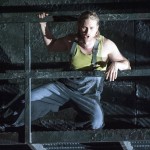The story of Billy Budd, a Herman Melville story which became the basis for Britten’s now classic opera, revolves around a seaman whose allure is so strong that John Claggart, the Master-at-arms on an 18th century war ship, conspires to eradicate his presence. Fate takes a strange twist when Budd, reduced to a stammer at accusations of mutiny, accidentally kills Claggart and is sentenced to death.
The title character is so full of vitality and good will that the ship’s captain, Edward Fairfax Vere, knows he has sentenced an “angel of God” to hang. Amid the shadows of imminent death, the infinite seas where victory is nowhere in sight, the whipping of sea men conscripted again their will, Budd carries the potential to reverse the gears in a machine of war that has trumped the human ability to love.
The Deutsche Oper made a bold move by casting its young ensemble member, John Chest, as the title character in a David Alden staging which premiered in the German capital on May 22. The 28-year-old American baritone, in his role debut, does not have the vocal heft of more seasoned cast members (the menacing bass of Gidon Saks as Claggart, or the piercing, almost angelic tenor of Burkhard Ulrich as Vere).
But he projected the charisma and rugged innocence that convey how this character is able to throw an entire ship off course, now jockeying with the chorus of seamen in the first scene of Act Two, now singing a stoic farewell. The all-male cast held itself to high standards in matters of both sound quality and diction, with stand-outs including Tobias Kehrer as Lieutenant Radcliffe and Thomas Blondelle as the Novice, who tries to convince Budd to stage an uprising.
The chorus of the Deutsche Oper struck a powerful blend with the orchestra while executing Alden’s finely-tuned directions (and choreography by Maxine Braham) during numbers such as “O heave” and “Yes, lost forever on the endless sea,” as they tugged giant ropes across the stage. Sets by Paul Steinberg capture the doomed circumstances with towering wrought metal barracks, penetrated only by the all-white chamber of Vere which tunnels in seamlessly.
It is was a surprise that the wheels of a rusted, concave wall representing the ship’s cabin were so loud as to disturb the sea of brass during the interlude between the final two scenes. That being said, the brass struggled with clean articulation and synchrony in Britten’s percussive scoring. The orchestra’s dark-hued strings, under Music Director Donald Runnicles, compensated with a gripping atmosphere both in brooding undercurrents and eerie interlocking counterpoint.
At the Konzerthaus…
The Berlin Piano Festival, in its third annual iteration, offered a rare occasion to hear the up-and-coming pianist Francesco Piemontesi in his home city on May 19. He performed to a full chamber music hall of the Konzerthaus despite competition in the main hall, where Igor Levit performed a Beethoven Sonata as part of the series Zwei Mal hören (“Hear it Twice”).
To be sure, Piemontesi is also a young pianist with a lot to say. He combines meticulous technical assurance with a nearly philosophical introspection and attention to emotional nuance that is wonderfully suited to the so-called Wiener Klassik.
His interpretative skills were at their height in Schubert’s Sonata in C-minor, D.958 as he conveyed the mystery, joie de vivre, and eternal longing that smolder beneath the deceptively simple musical elements. He made the piece his own from the moment he tore into the chords of the opening Allegro, effortlessly moving into a world of dreamy reflection.
His use of rubato and pauses allowed the music to speak for itself without a hint of artifice—perhaps the greatest challenge for a performer. In the spritely but death-intoned Menuetto, he revealed a naïve joy and complete absorption in the music’s ambiguities.
In Mozart’s Sonata in F-Major, KV 533/494, Piemontesi created a nearly operatic drama, moving from exasperation to childlike delight in the minor mode reprise of the opening Allegro, then desperate beseeching to adamant supplication in the slow inner movement. Both the emotional depth and bold attacks revealed the influence of his mentor, Alfred Brendel.
While this listener prefers a rounder touch for forte passages, particularly in Mozart, Piemontesi captured the sense of desperation beneath the notes. His temperament was even better suited to Beethoven’s Sonata in E-major, Op.109, with its fiery outbursts and resigned calm expressing an infatuation with Maximiliane Brentano, the daughter of the composer’s friend Antonie Brentano.
Piemontesi rounded out the program with a selection of Débussy Préludes displaying his clean virtuosity and powers of imagination. He recreated the angry wind of “Ce qu’a vu le vent d`ouest” with vivid strokes while also bringing a gentle touch to the floating chords of “La cathédrale engloutie,” even if one might have wished for more impressionist pedalwork.
For more by Rebecca Schmid, visit rebeccaschmid.info.
